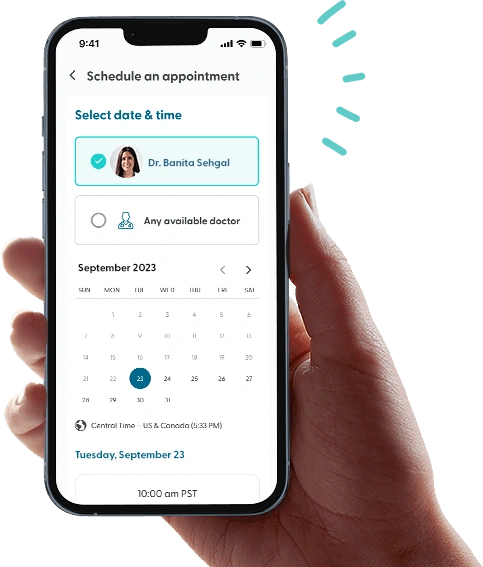A Comprehensive Overview of Menopause and Weight Gain
Menopause is a natural process that develops when women reach the end of their fertility cycle. It affects nearly all women by the time they enter their 60s.
Along with a variety of uncomfortable symptoms, many women experience weight gain and other unwanted side effects.
Navigating this transitional phase can be difficult, so it’s essential to understand why you might be gaining weight during menopause and what you can do to prevent it.
Ready to achieve your weight loss goals?
Shed pounds with GLP-1 medication prescribed online by licensed healthcare providers.


What is Menopause?
Menopause is a natural biological process that indicates the end of a woman’s reproductive cycle. It typically occurs in your late 40s or early 50s.
When going through menopause, women will experience a sharp decline in the production of hormones like estrogen.
This causes a hormonal imbalance that can lead to various symptoms such as:
Hot flashes
Night sweats
Mood swings
Sleep disturbances
Vaginal dryness
Menopause and Weight Gain
Weight gain during menopause is a common concern for women in this phase of their lives. The hormonal changes that occur during menopause often cause a shift in the way women’s bodies store fat and may contribute to weight gain.
Estrogen — one of the hormones that decline during menopause — is also responsible for regulating your body weight by influencing fat mass distribution and metabolism function.
With lower estrogen levels, you may lose muscle mass quicker and notice an increase of hip, thigh, and belly fat.
Age-related factors can also influence weight management during menopause. As women get older, they naturally experience a decrease in muscle mass, which can result in a slower metabolism.
When the metabolism slows down, the body burns fewer calories at rest and makes weight gain more likely.
Factors like being less physically active — which may be caused by age-related issues — can also contribute to weight gain during menopause.
Apart from hormonal and age-related factors, lifestyle choices also play a crucial role in weight gain during menopause.
Poor dietary habits — such as consuming high-calorie processed foods and excessive sugar — can also cause weight gain during this stage in a woman’s life.
When does menopausal weight gain usually start?
Many women gain weight during the onset of menopause — this stage is also known as perimenopause.
During this time, your hormones will already begin fluctuating, and the body will start to have difficulty regulating weight.
What are the Risks Associated with Gaining Weight During Menopause?
Gaining weight during menopause can have a number of associated risks. These include:
Increased risk of chronic diseases: Excess weight is associated with an increased risk of developing conditions like cardiovascular disease and certain types of cancer.
Metabolic changes: Weight gain can lead to metabolic changes like insulin resistance and glucose intolerance. This can contribute to the development of diabetes.
Joint problems: Carrying excess weight puts additional strain on the joints, which can increase the risk of developing osteoarthritis and other related issues.
Decreased bone density: Weight gain during menopause can accelerate the natural decline in bone density. This can increase the risk of developing osteoporosis or suffering from fractures.
Psychological impact: Weight gain may also have a negative impact on body image and self-esteem. These feelings may cause a sense of dissatisfaction and reduce the quality of your life.
It’s important to manage your weight during menopause to reduce these risk factors.
You can speak to your doctor about the different strategies you can implement to help you maintain a healthy weight as you go through menopause.
Strategies for Healthy Weight Loss During Menopause
Follow a balanced and nutrient-dense diet
Maintaining a balanced and nutrient-dense diet is essential for managing weight gain during menopause.
A diet rich in fruits, vegetables, whole grains, lean proteins, and healthy fats ensures that you get all the nutrients you need for your body to function optimally. This also helps your body maintain muscle which can prevent weight gain, especially for menopausal women.
Eating a balanced diet may also help you manage cravings that often occur when our hormones fluctuate. When you do have cravings, it’ll be easier to find a healthy alternative.
Portion control and mindful eating practices are essential to manage your caloric intake during menopause. Ensuring that you don’t consume a surplus of calories is also a great way to maintain your weight and avoid gaining excess pounds.
Regular physical exercise
Moderate-intensity physical activity — like aerobic exercise and strength training — may help you maintain a healthy weight during menopause.
As you gain muscle, your body burns more calories at rest, which makes it easier to control your weight.
Regular exercise also helps to boost and regulate your metabolism, preventing it from slowing down and contributing to weight gain.
Which physical activities are the best for weight management?
Aerobic exercises like brisk walking, jogging, swimming, or cycling, are great for improving calorie burn.
These activities also improve your cardiovascular health, reducing your risk of developing heart disease.
Strength training like weight lifting and bodyweight exercises can help you build and maintain muscle mass.
The more muscle you have, the higher your metabolic rate and calorie burn at rest — two factors that are essential for weight management.
You can also incorporate flexibility exercises like yoga or stretching into your daily routine. These exercises can improve joint mobility and flexibility, which may alleviate muscle tension.
Stress management
Excess stress may make it more challenging to manage your weight during menopause.
When experiencing stress, the body releases cortisol — a hormone that increases appetite and cravings, particularly for high-calorie foods. This can contribute to weight gain around the abdominal area.
Implementing effective stress management techniques can be beneficial for managing your weight during menopause.
Meditation, breathing exercises, and yoga are some activities that promote relaxation while reducing stress levels.
You can also engage in hobbies you enjoy, like pursuing creative outlets or spending time with your loved ones, to reduce stress.
Prioritize getting adequate sleep
Sleep deprivation can disrupt hormonal imbalances even further, leading to an increase in appetite and cravings. It can also negatively affect metabolism, making weight gain more likely.
Research has shown that insufficient sleep may also reduce your sense of feeling full after eating, which may lead to consuming excess calories and gaining weight.
To combat this, it’s important to prioritize quality sleep to help the body cope with already fluctuating hormones.
You can increase the quality of your rest by creating a peaceful environment, improving your sleep hygiene, and cultivating healthy bedtime habits. This includes:
Maintaining a consistent sleep schedule
Sleeping in a dark environment
Getting minimal exposure to electronic devices before bedtime
Ensure accountability and support
Getting enough support and having someone keep you accountable is an important aspect of achieving your weight loss goals during menopause.
The journey can be challenging, and having someone to motivate you can significantly impact your mindset.
Friends, family, and community groups can all offer emotional support, share their experiences, and provide practical advice that can help you achieve your weight loss goals.
Connecting with others who are going through similar phases of life can also reduce feelings of isolation that can make you feel demotivated.
You can also work with a healthcare professional or registered dietitian to help you develop a weight management program.
They can provide expert guidance and address concerns related to menopause and weight gain.
The experts at LifeMD can also create a personalized weight management program and have regular check-ins to make it easier to manage menopausal side effects.
Can Hormone Replacement Therapy Help with Menopause Weight Management?
Treatments like hormone therapy (HRT) may help alleviate some uncomfortable symptoms of menopause, including how body fat is distributed.
This is because HRT mainly involves supplementing hormones like estrogen, which is responsible for some aspects of weight management.
However, it’s important to note that HRT alone will not help you manage or shed excess pounds.
The treatment should be used in combination with other strategies — like following a healthy diet and getting more physical exercise — to be effective for weight management.
If weight management during the menopause transition is a concern, speak to your doctor about how HRT can impact this.
They will be able to determine if HRT is an appropriate treatment option based on your individual circumstances and recommend weight management strategies that can help.
Manage menopause with expert care.
Schedule your online consultation now to get tailored advice and treatment support.


Can You Prevent Weight Gain During Menopause?
It’s not yet clear if menopausal weight gain can be prevented completely. However, implementing weight management strategies as soon as possible may minimize its effect.
You should also speak to your doctor about what you can do about weight gain during menopause as soon as you can.
Taking proactive steps to maintain a healthy lifestyle and weight can be a good way to ensure you don’t gain too many pounds when you go through menopause.
Remember that menopause affects each person differently, so it might not always be possible to minimize weight gain.
In these cases, it’s still vital to ensure you maintain your healthy habits. This will help you improve your overall well-being while reducing your risk of developing other medical conditions.
Maintaining Realistic Expectations and a Positive Mindset
Setting goals and adopting a positive mindset are two essential components of navigating menopause.
Menopause causes various changes to occur in the body, and this can impact how quickly you are able to lose weight.
Setting realistic goals that take your individual circumstances into account can promote sustainable and long-term weight loss success.
It’s also important to avoid striving for an unrealistic ideal during this phase of life and setting goals can help you remind yourself of that.
Adopting a positive mindset can also help you navigate and manage your weight loss expectations.
It involves practicing self-compassion and gratitude while focusing on accepting your changing body.
Implementing these two factors into your daily life can be very helpful in making your menopause journey more manageable.
Not only do goals and a positive mindset help you prioritize what matters to you, but it’s also great for creating a more balanced and fulfilling life.
Learn More About Menopause and Weight Management
If you’re concerned about weight management or want to know more about how it can affect postmenopausal women, LifeMDis here to help.
A team of doctors can assist you with information and provide guidance on how to effectively manage your symptoms — all from the comfort of your home.
Make an appointment and start your journey to a healthier life.
More articles like this
Feel better with LifeMD.
Your doctor is online and ready to see you.
Join LifeMD today and experience amazing healthcare, discounted labs and prescription medications... plus around-the-clock access to medical guidance.

GLP-1
Ozempic® Wegovy® Zepbound®
This is it! Be part of the weight loss movement everyone’s talking about.
Get Started Now
 Medically reviewed and edited by
Medically reviewed and edited by 












